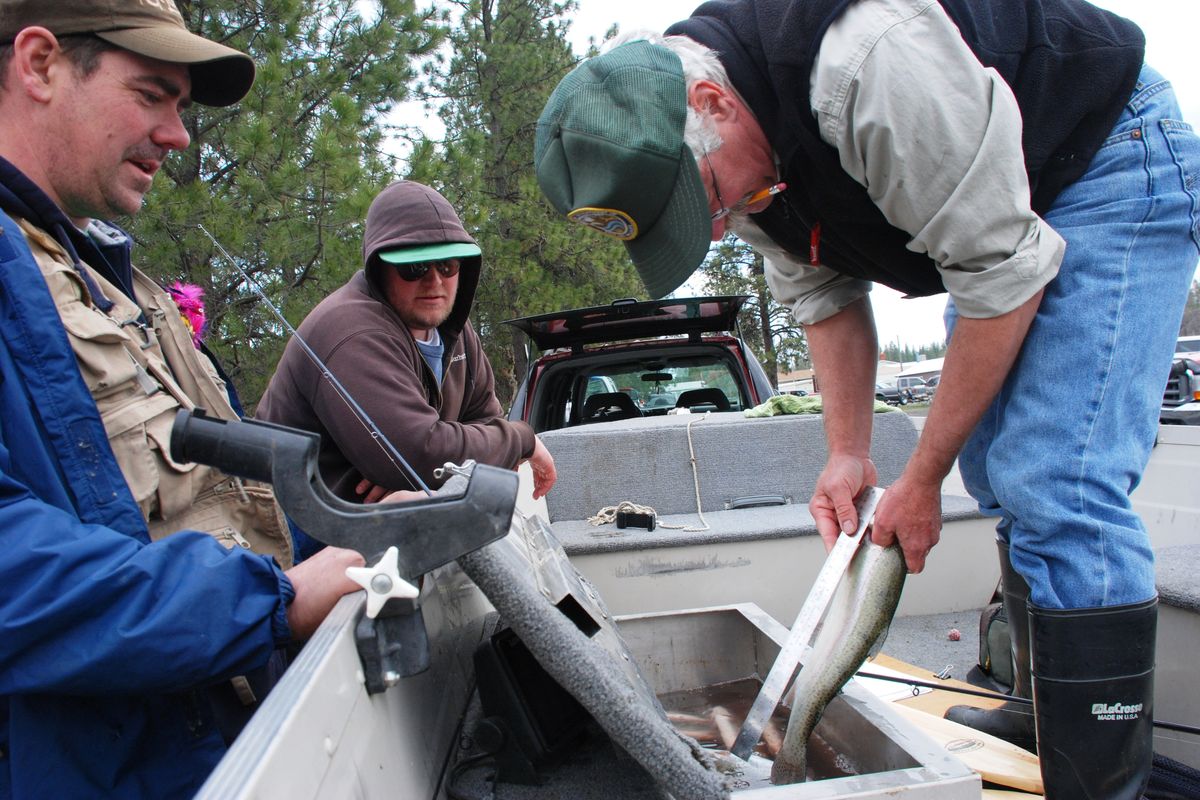Biologists make case for trout vs. bass at Badger Lake

A proposal to restore Badger Lake to its traditional status among the top trout fisheries in Washington got mixed reviews at a public meeting Wednesday in Cheney.
The Spokane County lake is one of three Eastern Washington lakes proposed by state fisheries biologists to be treated with rotenone. The organic agent kills fish by preventing their gills from processing oxygen.
This “lake rehabilitation” process has been done every 10-20 years for decades at selected lakes to rid the waters of warmwater fish species so they can be restocked with angler-prized trout that flourish without competition for food and habitat.
Badger’s last rotenone treatment was in 2002.
Chris Donley, Washington Fish and Wildlife Department inland fish program manager, says the lake has become prematurely infested with sunfish as well as largemouth and smallmouth bass that appear to have been illegally stocked in the lake.
“It looks like they put pumpkinseed sunfish in the lake to feed their bass, which was the worst thing they could do,” he said.
To satisfy the spring angler demand for trout fisheries, the state has been stocking catchable-size fish into Badger the last two years just before the fishing season opens in late April. Normally in trout-managed lakes, trout fry are stocked in the spring and fall and allowed to grow naturally in the lake to catchable size the next season.
Stocking trout fry is relatively cheap, requiring little feed and hatchery space compared with raising fish to larger sizes before planting in order to give them a better chance to survive being eaten by bass.
Tyler Brinks of the Spokane Bass Club said he went to Badger last weekend for the first time after hearing reports of largemouth bass catches up to 7 pounds.
“(I) was amazed at the quality and quantity of bass we were catching,” he said, noting that he caught bass to more than 4 pounds. He said he attended the Wednesday meeting to see if there was a compromise for having both bass and trout at Badger Lake.
District fisheries biologist Randy Osborn said the deceptive boom in the bass fishery is peaking and a decline is inevitable.
Bass anglers who opposed rotenone treatment of Badger comprised about half of the 18 people registered at the Wednesday meeting, Osborn said. The area’s two fly-fishing clubs support the proposal to rehabilitate Badger Lake as well as at least 38 of the 45 property owners that convened in an earlier meeting for stakeholders, he said.
The majority of anglers who fish at Badger are trout fishers who bring their families to the lake but are not affiliated with groups, he said.
Donley said the state has run out of hatchery capacity to raise the larger trout needed to survive in Badger if the bass are not removed.
“Unless it’s treated, it can’t be restocked with trout,” he said. “We can’t afford it.”
Spokane County already has mixed species lakes that include trout and bass, including Clear Lake and Downs.
Liberty, Diamond, North Silver and Silver Lake were among Washington’s top trout producing lakes 30 years ago before they were edged out of the trout management program, mostly because of changes in property ownership.
Donley, who grew up in this area, said he was 12 years old when he attended a meeting for a proposed rehabilitation of Silver Lake in which “bass anglers opposed rotenone treatments because it was the state’s best bass lake.”
Silver was at a similar stage as Badger is now, but its bass fishery has declined and so has the bass fishing interest, he said.
“The bass in Badger are an invading population that’s growing rapidly,” he said. “We’ve been boosting their growth by stocking 80,000 calorie-rich meals of delicious soft-fin trout the bass just love.
“But if we stopped managing for trout, the lake will tip to a different balance; the bass won’t grow as well on the prickly-finned sunfish.
“We are perched on the very top quality of Badger’s bass fishery. From here it’s all downhill. Then we’ll be back in the cycle where bass fishermen will want another lake.”
Many anglers are naïve about the booms and busts of fisheries and the complexity of fisheries management in the long term, he said.
Statewide, warmwater fisheries occupy far more surface acres of water than trout-managed fisheries, Donley said. Yet surveys indicate a majority of the state’s anglers prefer trout and about 50 percent of the anglers fish exclusively for trout species.
Donley said the department seeks to meet the demands of all the various angling persuasions in the state. Sprague Lake is being managed for a largemouth bass fishery that’s beginning to bloom. Tiger muskies are stocked in several lakes to satisfy a niche of trophy anglers and several biologists have been specializing in warmwater fisheries research in the region.
“But the trout fisheries generate the most interest in terms of families and businesses,” he said. “I’d hate to lose Badger from the trout program. We’re down to just six trout-managed lakes in Spokane County and Badger can be one of the best.”
About 120 lakes remain viable for trout monoculture fish management in Washington, Donley said, and the bulk of them are small potholes in Central Washington.
“Nobody’s lost more around Spokane than the trout fishermen,” he said.